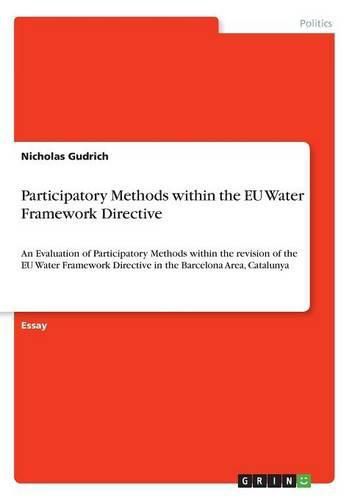Readings Newsletter
Become a Readings Member to make your shopping experience even easier.
Sign in or sign up for free!
You’re not far away from qualifying for FREE standard shipping within Australia
You’ve qualified for FREE standard shipping within Australia
The cart is loading…






Essay from the year 2015 in the subject Politics - International Politics - Environmental Policy, grade: 1,3, Leuphana Universitat Luneburg, course: Environmental and Sustainability Studies, language: English, abstract: This essay explores in detail the participatory methods employed by the Agencia Catalana de l'Aigua (ACA) during the revision of the WFD and offers an evaluation. As the European Union attemps to tackle the challenges of handling an ever growing number of issues within its ever growing boundaries and simultaniously tries to regain democratic credibility and rebuild its relationship with its citizens, the concept of participatory governance has taken central stage in european policy making. In this paper I want to explore the following questions: What kind of participatory methods were employed by Catalonia during the second cycle of planification of the EU Water Framework Directive in order to involve citizens? How can we estimate the quality of these methods and how do they comply with the theory of participatory governance?
$9.00 standard shipping within Australia
FREE standard shipping within Australia for orders over $100.00
Express & International shipping calculated at checkout
Essay from the year 2015 in the subject Politics - International Politics - Environmental Policy, grade: 1,3, Leuphana Universitat Luneburg, course: Environmental and Sustainability Studies, language: English, abstract: This essay explores in detail the participatory methods employed by the Agencia Catalana de l'Aigua (ACA) during the revision of the WFD and offers an evaluation. As the European Union attemps to tackle the challenges of handling an ever growing number of issues within its ever growing boundaries and simultaniously tries to regain democratic credibility and rebuild its relationship with its citizens, the concept of participatory governance has taken central stage in european policy making. In this paper I want to explore the following questions: What kind of participatory methods were employed by Catalonia during the second cycle of planification of the EU Water Framework Directive in order to involve citizens? How can we estimate the quality of these methods and how do they comply with the theory of participatory governance?